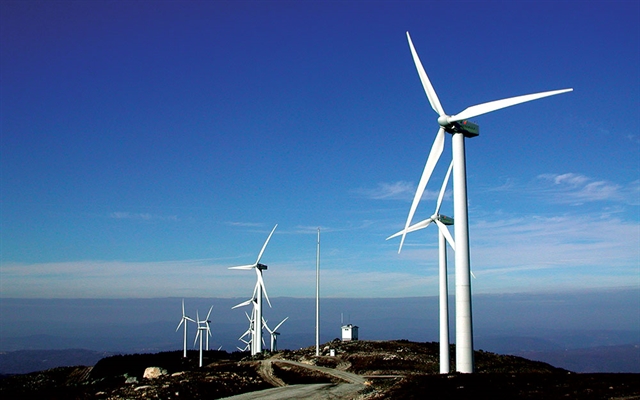 Economy
Economy


|
| A wind power project in northern province of Ninh Thuận. — Photo evn.com.vn |
HÀ NỘI — Việt Nam’s energy sector is on the right track developing and using clean and renewable energy, but there are still obstacles ahead to ensure a greener power supply, experts said.
Rapid economic development as seen a surge in demand for energy, posing great challenges when the primary sources like coal, oil and gas are exhausted.
Speaking at the Việt Nam Energy Forum 2020 held in Hà Nội on Thursday, deputy minister of Industry and Trade, Hoàng Quốc Vượng said energy has an extremely important position and a big impact to global sustainable development.
“Việt Nam’s energy sector has seen strong development, basically meeting with demand for production and people’s lives as well as contributing to the national defence and security,” he said.
Demand in the past decade increased by 14.6 per cent. Electricity alone saw an average growth rate of 9.5 per cent.
It is expected that the power demand would still have growth rate of 8.5 to 9.5 per cent in the next five years. With the high demand, the electricity capacity should reach 13,000-14,000 MW per year. However, the current capacity was 6,000 MW, causing a need of a further 5,000-7,000 MW annually.
“This has been a challenging task for the sector,” Hoàng said.
“The Power Development Master Plan VII has been revised since 2016 but is still delayed. In the context, the Government and the Ministry of Industry and Trade (MoIT) have adjustments to make to accelerate the development of clean energy such as solar and wind with high potential.
“The Government has promulgated policies and mechanism to further promote clean energy development.”
Solar and wind power have seen strong breakthroughs. Solar energy now has a capacity of more than 5,000MW and wind power of 1,000MW. It is expected the capacity of wind power would add 3,000-5,000 MW in one or two years.
Sharing the ideas, Hoàng Tiến Dũng, director of the ministry’s Electricity and Renewable Energy Authority said despite strong advances, large scale renewable energy development has been limited. This was because power energy has not been synchronised with the development speed of renewable energy sources. There are not enough backup sources and storage system to integrate renewable energy on a large scale.
Dũng said: “In addition, the renewable energy development policy has not been applied for a long time. There is no mechanism to attract investment capital for renewable energy development through bidding and there is no overall study on the development of offshore wind power projects in Việt Nam.”
Meanwhile, Bùi Quang Tuấn, head of Việt Nam Economic Institute said facing trends in implementing green growth, ensuring environmental requirements, quality of life, a number of leading countries such as Sweden, Denmark, Scotland, Germany and China also aims to achieve 30 per cent of renewable energy by 2030. Việt Nam has striven to reach 20 per cent of renewable energy in ten years time. This is a big development step in the Power Development Master Plan VII.
“Currently, there is a race in using renewable energies,” he said.
“This is an objective trend, which has pressures from developing countries which are facing green growth, environmental protection and reduction of greenhouse gas emissions,” he said.
Encouraging participation of private sector
Experts said the participation of the private sector could create markets and bring higher competition. To attract the private sector, it is necessary to be equal in treatment. Private participation more deeply in the energy sector would not only ensure the nation's energy security, but also creates a transparent environment for the economy’s sustainability.
Dũng said Government should focus on policies, transmission infrastructure and dispatching of electricity system operation.
Tuấn meanwhile suggested creating policies to liberalise the renewable energy market to attract non-governmental investment, especially FDI firms.
Võ Quang Lâm, deputy general director of the Việt Nam Electricity (EVN) said renewable energy has seen large development and focus on some localities, affecting to the release capacity as well as the dispatching and operating the electricity system. In particular, the country has lacked technical standards for rooftop solar power.
Lâm said currently, some countries have strongly developed rooftop solar power. Taking the lead is Australia with 14,000 MW and Germany with 7,000 MW of rooftop solar power.
“EVN is co-operating with GIZ to study and set up a technical system for rooftop solar power and submit it to the MoIT and the Ministry of Science and Technology for approval,” he said. — VNS




